Part 3: The “D” Word
October 7, 2015:
I had a meeting with the FIE (Full Individual
Evaluation) evaluator/diagnostician to review test results for Julia. It was
determined that she did not qualify for dyslexia or Special Education services.
The evaluation revealed that Julia is a bright student. She has some weak
areas, but she did not fall below the district line to qualify for Dyslexia.
Based on the evaluation, the examiner did recommend the following accommodations be considered for Julia to achieve and maintain satisfactory progress in school:
- Teach cursive writing, teaching each letter
to mastery. Provide the following sequence: modeling, copying, feedback,
correction of errors, and positive reinforcement.
- Allow Julia to use frequently used word
lists to assist with spelling.
- Provide an explicit and multi-sensory
approach to teach spelling skills. Teach Julia to segment and decode words
sound by sound.
- Provide extensive review and practice for
visual recall of letter sequences and words.
Hum, something is not adding up with these
findings. If I understood it correctly, Julia is not dyslexic, but should be
treated as if she were (go back up and read the bullet points again, I'll
wait....).
On a separate note, because of this evaluation, Julia IS now a part of the GT\ALPHA program. Some of the scores were very high. Deadlines for the program were specifically rearranged for Julia, and this evaluation was submitted for consideration for acceptance to GT\ALPHA (she did not have to retake the district test for GT\Alpha).
I just find it odd that for 2 years she tested and
was told she did not get accepted into the GT\ALPHA program because of her
COGAT scores. They were not high enough. For 2 years, she slipped
through the cracks. We now have a more accurate measurement of Julia’s
intelligence. And only now is she being taken seriously for GT\ALPHA.
Which reminds me of another issue, Julia’s struggles.
She struggles with basic math yet can do the advanced math she’s currently learning in class. She can’t spell. She has issues with decoding words and letter sound blends. Her handwriting is suffering.
Here’s the kicker. She’s not failing enough. When you compare her to the average child, her lows are average.
Sound familiar?
The evaluation proves that Julia is not average. Remember the whole GT\ALPHA thing? Julia was being compared to the national norms for identifying dyslexia. Only, she’s not average or normal.
Julia was not performing to HER level.
October 15, 2015:
I attended the ARD meeting, and no surprise to
me, it was predetermined that Julia did not qualify for dyslexia or Special
Education. The RTI team (yes, the RTI team, no that did not include me) met
privately after to review the test results and make recommendations.
October 20, 2015:
Principal arranged for me to meet the ISD dyslexia lead in her office. To be honest, the meeting with district dyslexia lead was a disaster. She did not allow me to speak. When I was able to get a word in, she would railroad me and always interrupted. Twice she told me “I may be crossing the line by saying this, but” and it was followed by either “you daughter is not dyslexic”, “in a private setting, I’m not qualified to diagnose or identify dyslexia, only remediate like a dyslexia specialist” or “your daughter is more likely to have ADD or need therapy than she is dyslexic”.
So, yeah, the meeting did not go well, but one thing that came out of it…. a fire was lit, and I was going to make it blaze.
Wed, October 21, 2015 (12:15 PM):
In my fury, I sent e-mails out to people I could
find that worked with 2e dyslexics. I included her testing, a letter about my
daughter, and samples of her work. I was surprised by how many responses I received
back. However, it would require travel to other states.
Wed, October 21, 2015 (3:29 PM)
I received an email response from Region 10. I ended up working with the person that was
over the entire state, not just Region 10, for dyslexia. We spoke on the phone
that day as well as the next day. Because of the everything that had happened,
they offered to call the ISD on our behalf.
Here is what I learned:
1. Julia IS dyslexic
2. She does NOT need an IEE (Independent
Educational Evaluation) to get a diagnosis. The evaluation performed clearly
proves she's a Gifted Dyslexic (2E).
3. She does qualify and needs the dyslexia program.
Her reading, while it may be average, is low for Julia and a good dyslexia
program will help her make connections and bring her reading up.
4. She qualifies for a 504
5. She qualifies for accommodations and WILL
need them in GT & other areas.
The BIG one:
6. If the district denies these services to
Julia, they are in violation of Texas State law.
October 26, 2015:
Guess what, the principal called and stated she had spoken with the Director of Special Populations, and that due to extremely unusual circumstances, Julia was being accepted into the dyslexia program and would receive a 504 where she would be called dyslexic.



Comments
Post a Comment